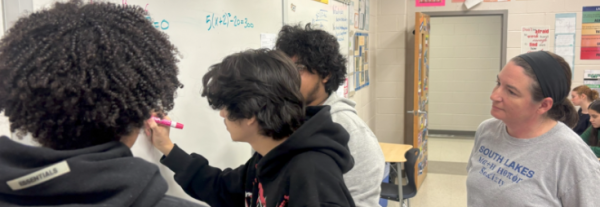Food for thought
Local food experts Cochrane, Stowers, offer healthy alternatives to stress eating habits while studying
Most people turn to comfort food now and then. Students, in particular, tend to comfort eat more often due to school stressors.
Stress eating, a common phenomenon, usually afflicts students whilst studying and eating at the same time.
While focused on the cause of stress, people tend to overeat and choose less nutritious options.
“I basically binge eat,” senior Melissa Thomas said. “Eating while studying helps me focus and de-stress.”
Many students seek sugary snacks when stress eating, especially while studying.
“I do not eat healthy while studying because I can only do one good thing at a time,” junior Jamie Swartz said. “I eat cheese balls and cookies. The more sugar I eat, the more awake I am.”
Although Swartz feels more awake due to a sugar-induced energy rush, the feeling is temporary.
Consumption of simple carbs such as cheese balls and cookies offers little nutritional value, resulting in a sugar crash, and craving for more sugar.
Nutritionist Teri Cochrane, who works for Healing Paths, which offers nutrition and wellness counseling, explains the science behind stress eating.
“People stress eat because they think they need sugar,” Cochrane said. “The adrenal glands release a stress hormone called cortisone which creates a sugar high in the body and then a sugar crash. That sugar crash leads people to seek sugar but it’s the last thing they need.”
While sugar is a quick-fix for a little energy, there are many foods that will provide long term energy.
Culinary arts teacher Cynthia Stowers recommends consuming foods with high levels of protein in order to feel full longer as well as foods that are made up of complex carbohydrates.
“Food with high protein levels, like a handful of nuts, will sustain you for a longer period of time [when studying],” Stowers said. “Complex carbs, such as pasta, rice, carrot sticks, or hummus and vegetables will give you energy longer.”
Cochrane agrees that combining protein with complex carbohydrates is a good way to combat unhealthy stress eating habits.
“A nut-butter sandwich on whole grain bread is a good stress food,” Cochrane said. “The fat helps balance sugar cravings.”
Although food is key, Stowers advises students to stay hydrated when studying by drinking water, which keeps students alert. Stowers also recommends avoiding coffee.
“Students tend to drink lots of coffee while studying,” Stowers said. “Coffee tends to make most people jittery and therefore [they] cannot focus.”
Like Stowers, Cochrane warns against drinking coffee. Cochrane suggests that students drink chamomile tea as a stress reducer. Chamomile tea is a way students can stay healthy while stressed and studying.
“I try to focus on healthy options because I know they are better for you,” junior Lily Vogelson said. “Healthier foods provide the best source of energy. If I eat sugary or fatty snacks, then I won’t be as focused.”
Cochrane also offers guacamole or hummus with whole grain chips as another option for students to stay alert and finish their work.
“They have fats and good fiber,” Cochrane said.
According to Cochrane, stress depletes minerals and vitamins, which is why it is important to eat nutritious foods, despite unhealthy sugar cravings.
“I usually eat apples or other kinds of fruit,” junior Andrew Duran said. “Eating candy makes me lazy, that’s why I choose not to eat it while studying.”











